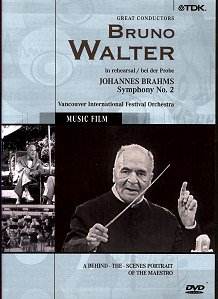"If he is a man with a warm heart and is
honest and sincere, the musicians will listen to him and accept
what he says even if they are more experienced." So says
Bruno Walter during a conversation with his friend Albert Goldberg.
This lasts 22 minutes and forms the "interval talk"
on this DVD. The conversation is fascinating, partly because of
historical anecdotes in abundance plus the conductor’s views on
modern music and the behaviour of audiences and music lovers.
Given his views, I hate to think what he would have made of lovers
of Classic FM.
The musical part of this DVD consists of Bruno
Walter, in the final years of his life, rehearsing the Vancouver
Festival Orchestra in the first movement of Brahms Second Symphony,
and after the interview, the same orchestra being rehearsed in
the finale. Apparently it was Walter’s first rehearsal with the
orchestra, and it is interesting to see how quickly he starts
to build a relationship with the ensemble. It could be, however,
that it took a lot longer, and the effect has been enhanced by
judicious editing. Once he gets going, the overriding quality
is that of a singing quality to the playing.
His rehearsing technique is that of working with
his group, and persuading them, bit by bit, that the conductor’s
way is the right way, and keeping on at the phrase until he is
totally satisfied. The whole orchestra is seen to respond positively,
until Walter is satisfied with the results.
As with many of these rehearsal discs, I miss
the opportunity of hearing the complete work once the rehearsals
have finished, but like many others of this type, we only get
the rehearsal. It is probably to do with contractual/royalty issues,
and it is worth losing the complete work to be able to eavesdrop
on the creative part of a performance. The original audience must
have been served up a treat.
In the "interval", we have Walter,
talking to his friend, Albert Golberg, about music in general
and Bruno Walter in particular. Areas covered are his early life,
learning his art in the opera pit, his early experiences with
Mahler, his departure from Germany at the start of the war and
how he came to settle in the U.S. The conversation progresses
quite innocuously until Golberg asks Walter what he thinks about
modern music. There follows a strong, highly opinionated description
of modern music and how Walter reacts to it.
Fans of twelve tone music should stop the DVD
here, as he has found absolutely no sympathy with this type of
music. He has chosen his repertoire from experience, and is switched
off from a large body of music and expounds his reasons why clearly,
concisely and illuminatingly.
From modern music, Walter moves on to music in
general and music lovers. Here he expects listeners to be totally
immersed in the music and to concentrate completely on what is
happening. He is generally negative towards radio and TV, although
he recognises that music appreciation had expanded considerably
as a result of recorded sound. What he is keen on is the playing
of complete pieces and not on bits and pieces.
The notes are short but very informative. This
is a disc that I will return to frequently.
John Phillips
